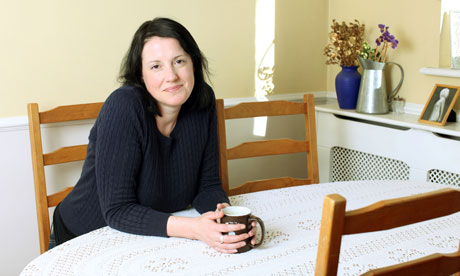
'It was the 'are you pregnant?' comments that did it," says Suzy Norman. Four years ago, the former primary school teacher from east London noticed her stomach was often unusually bloated; by Christmas 2008, it had swelled so much that her family, friends and even strangers began to ask when her baby was due.
Norman, 37, knew she was not pregnant. For months, her doctor had insisted she had irritable bowel syndrome. Unconvinced, she went to A&E. After a series of scans, one of her ovaries was removed and she was then told she had ovarian cancer. It was so advanced that the only option was to remove the other ovary and her womb; she then underwent three months of chemotherapy. "It was just horrendous," she says. "I lost my hair; I had painful, aching legs. I went from being a busy teacher to just flopping on the sofa. But it did seem to work: I'm pretty well now."
Norman is relatively fortunate to have caught the disease in time: the symptoms of ovarian cancer often go unrecognised by women and GPs, and it has one of the worst survival rates of all cancers. According to the charity Target Ovarian Cancer, around 6,500 women in Britain are diagnosed with ovarian cancer each year, and 4,400 lose their lives to the disease. The five-year survival rate in the UK is just 36%: that is one of the lowest in Europe, and has changed little over the past three decades. By way of comparison, UK survival rates for breast cancer have risen over the same period from around 50% to more than 80%.
The poor survival rate for ovarian cancer is strongly linked to late diagnosis because of a lack of awareness of the early symptoms, which include persistent bloating or abdominal pain; difficulty eating or feeling unusually full; and needing to urinate often or urgently. According to a study last month by Ipsos Mori for Target Ovarian Cancer, just 3% of women feel confident in their ability to recognise these symptoms (by contrast, more than three-quarters of the 1,004 women questioned recognised that a breast lump could be a sign of breast cancer).
For Annwen Jones, chief executive of Target Ovarian Cancer, increasing awareness of these early symptoms is a key factor in improving women's chances of survival. "Our study showed a really positive increase in awareness of ovarian cancer among GPs," she says. "But we need to improve awareness among women generally. If ovarian cancer is diagnosed in its earliest stages, the survival rate rises to 70%. The sooner we can diagnose, the more women will survive. It's that simple." The charity is campaigning for ovarian cancer to be included in the government's Be Clear on Cancer public-information project, which has seen TV ads made about the symptoms of other cancers, such as bowel cancer.
Rona Passmore, 50, a part-time support worker for adults with disabilities, from Dunbar, knows only too well how important it is to catch ovarian cancer in its earliest stages. In August 2008, she realised her stomach was often distended, but put it down to the menopause. One night, however, she woke with excruciating abdominal pains. The next morning, she went to see her GP; after ruling out a pregnancy, he sent her straight to A&E, suspecting ovarian cancer. His suspicions were confirmed. "I had a scan," Passmore says, "which showed that I had a huge ovarian cyst. The doctors advised removing both the ovary and the womb; when they found a tumour attached to the cyst, they also advised a course of chemotherapy."
The treatment was successful – Passmore is now down to six-monthly check-ups. Her oncologists were very impressed with the speed of her GP's response. "They kept saying how lucky it was that my GP had sent me straight to hospital. I knew about cervical cancer and breast cancer, but pretty much nothing about ovarian cancer. Now, I'm telling everyone about it."
Norman is sure her own lack of understanding of the disease, and her GP's failure to correctly diagnose her symptoms, led to a serious delay in treatment: two years elapsed between first noticing the bloating and admitting herself to hospital. "I just didn't know anything about ovarian cancer," she says. "I was busy, I was getting on with my life, as we all do, and my GP was very tardy in admitting that anything was wrong.
"I can't help wondering," she says, "about what might have happened if my doctor hadn't been so slow. My husband and I hadn't really been thinking about having children, but of course we did as soon as we realised that we wouldn't be able to. Perhaps, if the cancer had been found earlier, they could have saved one ovary. We might have still been able to have children. Not knowing for sure either way is the hardest thing of all."
• For more information, visit: targetovariancancer.org.uk.

